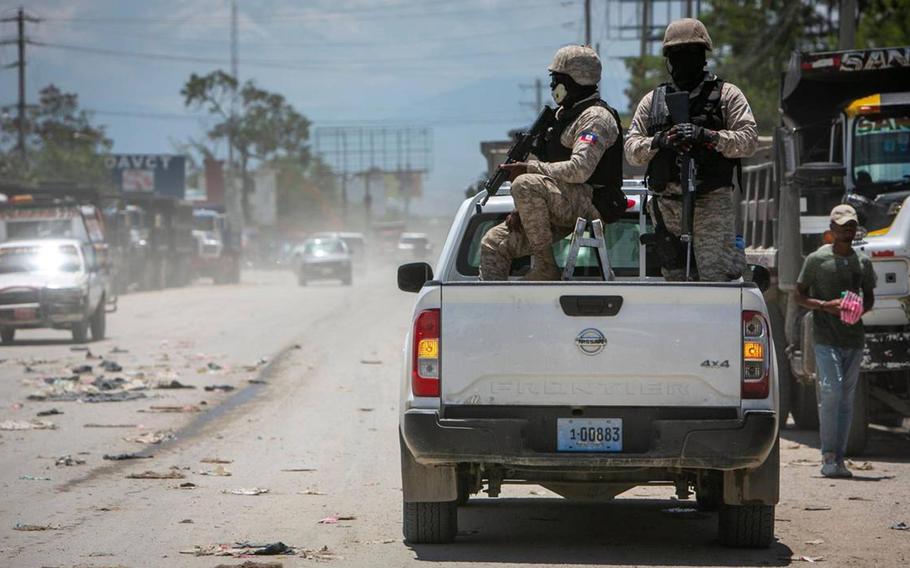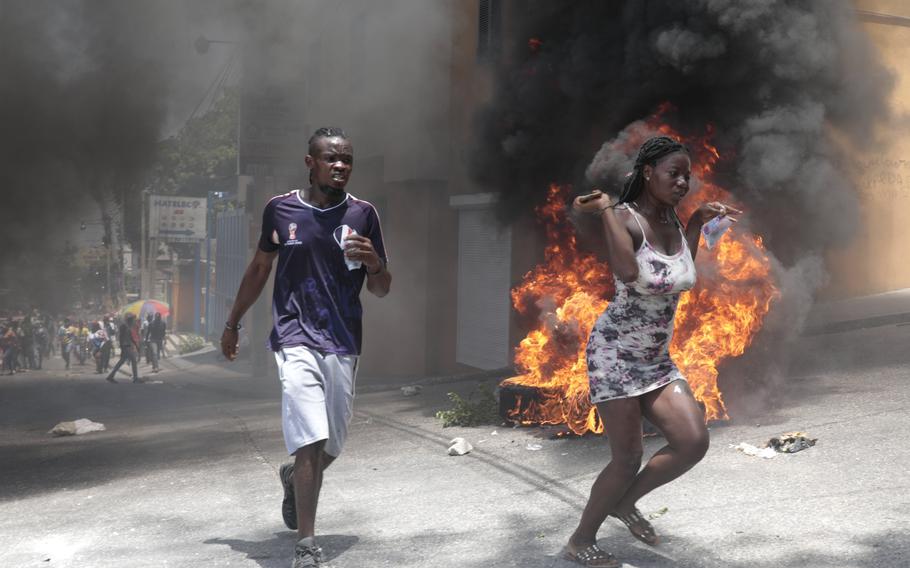
Haiti police on patrol keep their eyes on traffic during a stop at a police checkpoint in Tabarre, near the U.S. Embassy. (Jose A. Iglesias/TNS)
NEW YORK (Tribune News Service) — The Biden administration says it has received commitments from countries throughout the world — from South America and the Caribbean to Asia and Africa — to join in a multinational force that would deploy to Haiti, pending a resolution from the United Nations Security Council.
The commitments are significant because Kenya, which has volunteered to lead the mission to help Haiti’s struggling police force combat deadly gangs, conditioned its participation on several factors. They include the blessings of the Security Council and the deployment of least 2,000 law enforcement officers — with Kenya itself sending 1,000 — with contributions not only from the Caribbean but other nations.
“We’ve got countries from every continent willing to contribute here to Haiti,” Acting Deputy Secretary of State Victoria J. Nuland said Friday, moments after Secretary of State Antony Blinken ended a meeting on the sidelines of the United Nations General Assembly on the security situation in Haiti.
Blinken’s meeting attracted more than 34 ambassadors, foreign ministers and representatives from countries, some of them permanent and non-permanent members of the Security Council. Nuland said while some came forward with concrete offers of support, others in the room said they would find a way to support the mission.
“There was very strong support in the room from everybody for the U.N. Security Council resolution,” she said at a press conference joined by Brian Nichols, assistant secretary of state for the Western hemisphere.
The U.S., along with Ecuador, have penned a draft resolution being circulated among the 15 members of the Security Council that would approve a deployment into Haiti led by Kenya. Though U.S. officials have expressed cautious optimism about its passage, it is not a done deal.
China, which has raised questions about the force, and why a resolution is even needed for what would be non-U.N. deployment of troops by another nation, had asked for the negotiations to stop this week, the annual session of the U.N. General Assembly. China is one of five countries that, like the U.S., has veto power at the Security Council. Sources familiar with the negotiations told the Miami Herald that some of the concerns have to do with financing, rules of engagement and the exit strategy for the international force, among others.

Demonstrators run past tires set on fire during a protest against insecurity in Port-au-Prince, Haiti, Monday, Aug. 7, 2023. (Odelyn Joseph/AP)
Other nations also want to see more progress made on the political front in Haiti, where efforts between Haitian Prime Minister Ariel Henry and opposition and non-governmental groups have stalled.
U.S. officials continued to press for a political agreement on Friday as they announced five additional visa restrictions n “current and former Haitian officials who are enabling the violence.” The new designations bring the total to more than 50 individuals who have been barred from entering the United States since last October, when the designations began in earnest as part of a foreign policy shift.
The U.S announcement came on the heels of designations by Canada, which on Thursday imposed sanctions on three powerful members of Haiti’s economic elite.
In his opening remarks at the security meeting, Blinken touted both the United States’ sanctions and its humanitarian support of Haiti, saying the U.S. remains the single-largest donor of aid, more than $205 million in the last two years. The U.S. has also provided more than $120 million to bolster the Haiti National Police and will provide an additional $65 million.
“Having said all that, we also know that more, much more from all of us is needed; that’s especially true given the recent closures of all border closings between Haiti and the Dominican Republic,” he said.
Blinken said the situation in Haiti has become dire and the reason the U.S. supports Kenya’s vision for a three-part mission: Providing “static” security at key infrastructure sites such as the airport and seaport, operational support for the Haiti National Police as they go after gangs, and strengthening the Haiti National Police.
A stable security environment in Haiti, Blinken said, is crucial in order for aid to flow, for conditions to improve and for political dialogue to be possible.
“Assistance from international partners can play a crucial bridging role,” he said, thanking countries that have stepped up. “With your support, this mission can deploy within months.... The safety and the security, the future of the Haitian people and people across the region, depend on the urgency of our action.”
Blinken declined to provide the names of nations, other than the Caribbean countries of Jamaica, Antigua and Barbuda and the Bahamas, that have offered to participate in the deployment to Haiti. But he listed several entities that have called for outside assistance: the government of Haiti, Haitian civil society, the U.N. Secretary-General, the Organization of American States and the 15-member Caribbean Community.
Not all Haitians support a multinational deployment, On Friday, some Haitian organizations in the U.S. began circulating an open letter to the Biden administration opposing the intervention. The letter was authored by the National Haitian American Elected Officials Network and Miami-based Family Action Network Movement.
“Any military intervention supporting Haiti’s corrupt, repressive, unelected regime will likely exacerbate its current political crisis to a catastrophic one. It will further entrench the regime, deepening Haiti’s political crisis while generating significant civilian casualties and migration pressure,” the letter said. “If the U.S. is genuinely interested in stabilizing the political situation to avoid a catastrophic humanitarian crisis in Haiti, it will start by ceasing to prop up the corrupt government and allow the emergence of a consensus transitional government with the legitimacy to decide how the international community can contribute.”
U.S. officials have not addressed the letter. But Blinken stressed that improved security in Haiti must be accompanied by real progress to solve the political crisis.
“The support mission will not be a substitute for political progress,” he said. “Indeed, it can help create space for Haiti to move forward.”
Blinken said the Biden administration is prepared to work with Congress to provide at least $100 million in support to the Kenyan-led mission, while the Pentagon will provide planning and logistical support such as air lifts.
Blinken, who was sitting between Haiti Prime Minister Ariel Henry and Kenya Foreign Minister Alfred Mutua, reiterated the administration’s call for the Security Council to urgently pass the resolution for the mission, which Haiti requested almost a year ago next month.
Since then, the violence and kidnappings have only grown worse, with armed gang members this week taking to the streets to call for the overthrow of Henry. On Thursday gang leaders began circulating a message that after years of not being in communication with one another they are increasingly uniting. That development is raising concerns that the armed gangs could be plotting some kind of coup.
Blinken stressed that the situation in the country is dire and Haiti doesn’t have time to lose.
“More than 2,000 killings the first six months of this year, more than 1,000 kidnappings in the same period, over five million Haitians who urgently need humanitarian assistance, tens of thousand of Haitians facing catastrophic hunger, nearly 60,000 suspected cholera cases, nearly half of [them] children,” he said.
Places like Cite Soleil and Cabaret have been cut off from clean drinking water and electricity for more than a year, while hospitals and health clinics are shuttered and people are going days without a single meal.
“It means parents not being able to send kids to school,” Blinken said, with gangs targeting young girls and women for rape.
“Wandering outside the neighborhood to shop for groceries, to look for work, can be and often is, a death sentence.”
©2023 Miami Herald.
Visit at miamiherald.com.
Distributed by Tribune Content Agency, LLC.